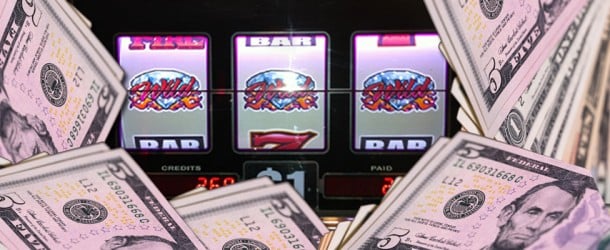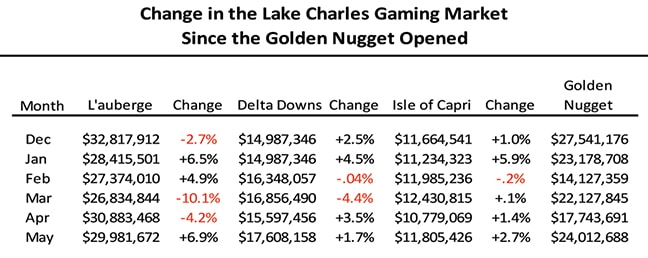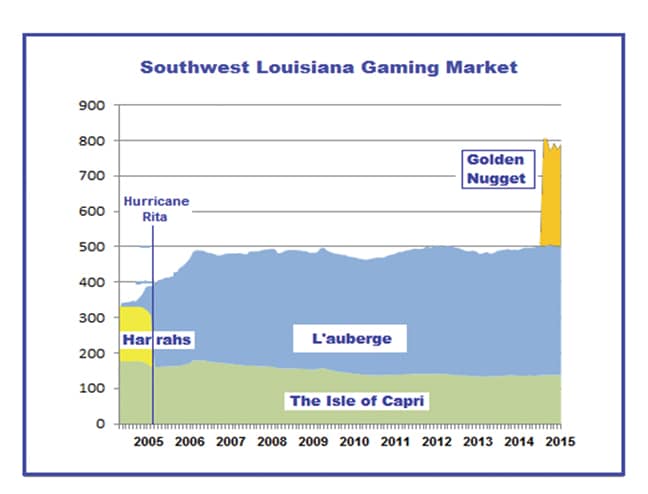Lake Charles Gaming Approaches $1 Billion
The Golden Nugget opened in December. And while the casino has had a few ups and downs in its early going (business was off in February and April), it appears to be on track to do close to $300 million in its first 12 months.
Before “The Nugget” opened, some feared its business would come at the expense of our existing casinos: L’Auberge, The Isle of Capri and Delta Downs. But that has not been the case.
The above table shows the monthly gaming revenue reported to the Louisiana Gaming Control Board by area casinos since December. (Data are not available for Coushatta because Indian casinos are not required to report their revenue to the state.)
The Golden Nugget has added nearly $129 million to the local gaming market with little or no loss of revenue by the existing casinos.
How is this possible? The additional revenue the Nugget brought in is not from local residents. Everyone here with a propensity to gamble already had a casino within minutes of their home. Nor is it likely to have come from passers-by on the Interstate. This growth in revenue suggests that Lake Charles is becoming a “destination gaming market” and that’s good news for our economy.
When casinos serve primarily local residents, they’re unlikely to provide much economic stimulus and may, in fact, be a drain on the local economy. (Residents are unlikely to gamble their way to prosperity.) The object is to get people from other areas to leave their money at your casinos. The challenge for the casinos is to provide an enjoyable and entertaining experience that will keep them coming back.
To become a destination market, an area must offer more than just slot machines and gaming tables. It must have such amenities as luxury hotels, shows and entertainment, fine dining, recreation and tourist attractions. This combination creates lots of jobs and draws visitors who are not solely interested in gambling and are likely to spend money at other local businesses.
But casinos, like any other business, don’t like to spend money that doesn’t enhance their bottom line. The best way to make casinos spend their money developing their properties is by making them compete for patronage.
When Lake Charles got its first riverboat casino in 1993 it was the only game in town, made huge profits, and even required patrons to buy a ticket just to get on their boat.
This changed a bit when the Coushatta casino opened and the Isle of Capri obtained a license to operate in Westlake. But the boats were still packed on the weekend with local residents and day-trippers from Texas, so casino owners had no need to build luxury hotels, golf courses or other amenities to attract more patrons.
Pinnacle raised the bar when it entered the market in 2005. Harrah’s left Lake Charles when its boats were destroyed by Hurricane Rita and Pinnacle picked up most of their business. But Pinnacle was not going after local residents and day-trippers when they built their luxury hotel to look like a Texas hill country lodge; they knew Houston was one of the biggest feeder markets for Las Vegas and they were going after high-rolling Texans.
L’Auberge added nearly $200 million a year to the Lake Charles gaming market (see the graph on this page) and demonstrated it was possible for Lake Charles to compete in the Houston market.
They also drew patrons from Lafayette and Baton Rouge to our east — something Harrah’s and the Isle were never able to do.
Now the Golden Nugget is demonstrating that two casinos are better than one when it comes to attracting destination gamblers.
Those who worry that Texas will one day legalize gambling and wipe out the Lake Charles casinos should understand that if something is legal anywhere in a state, it must also be legal on Indian reservations. Thus, if Texas were to allow even one casino in Galveston, every Indian reservation in Texas could open a casino and they would not have to pay taxes to the state. The only way Texas can profit from gambling would be if it were illegal everywhere in the state and the Indians came to the state and offered to give the state part of their profits in return for the exclusive right to operate casinos. That is how Oklahoma and Florida got their Indian casinos, but I doubt it will happen in Texas.
A potentially greater threat to the development of our gaming market, which is approaching a billion dollars a year when Delta Downs is included, is what happened recently in New Orleans. The city council there banned smoking in all bars and casinos. Since the ban went into effect April 22, Harrah’s has seen a 16 percent decrease in its business. That could cost the state as much as $100 million in gaming revenue.
Harrah’s has invested a considerable amount of money revitalizing the area around its casino, especially along Fulton Street, and they are now at a considerable disadvantage in competing with other markets.
A similar ban in Calcasieu Parish would provide a huge boost to the Coushatta casino, which is not likely to ban smoking, and would put a damper on further casino development in Lake Charles.

















Comments are closed.